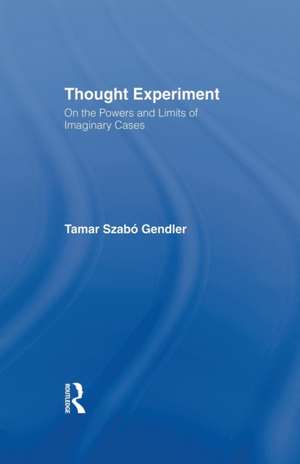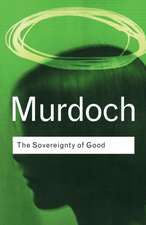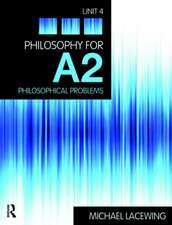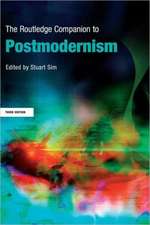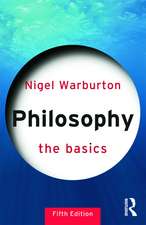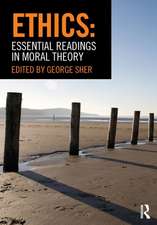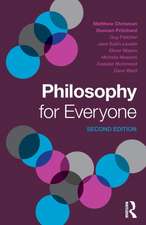Thought Experiment: On the Powers and Limits of Imaginary Cases: Studies in Philosophy
Autor Tamar Szabo Gendleren Limba Engleză Paperback – 29 feb 2016
| Toate formatele și edițiile | Preț | Express |
|---|---|---|
| Paperback (1) | 436.14 lei 6-8 săpt. | |
| Taylor & Francis – 29 feb 2016 | 436.14 lei 6-8 săpt. | |
| Hardback (1) | 1110.92 lei 6-8 săpt. | |
| Taylor & Francis – 2 noi 2000 | 1110.92 lei 6-8 săpt. |
Din seria Studies in Philosophy
- 9%
 Preț: 1037.82 lei
Preț: 1037.82 lei - 9%
 Preț: 1004.93 lei
Preț: 1004.93 lei -
 Preț: 487.86 lei
Preț: 487.86 lei -
 Preț: 489.99 lei
Preț: 489.99 lei -
 Preț: 480.28 lei
Preț: 480.28 lei -
 Preț: 482.74 lei
Preț: 482.74 lei - 18%
 Preț: 1056.28 lei
Preț: 1056.28 lei -
 Preț: 478.71 lei
Preț: 478.71 lei - 18%
 Preț: 949.78 lei
Preț: 949.78 lei -
 Preț: 481.58 lei
Preț: 481.58 lei - 31%
 Preț: 763.39 lei
Preț: 763.39 lei -
 Preț: 482.35 lei
Preț: 482.35 lei -
 Preț: 488.12 lei
Preț: 488.12 lei -
 Preț: 491.68 lei
Preț: 491.68 lei -
 Preț: 436.75 lei
Preț: 436.75 lei - 18%
 Preț: 1056.28 lei
Preț: 1056.28 lei - 18%
 Preț: 1056.28 lei
Preț: 1056.28 lei -
 Preț: 482.82 lei
Preț: 482.82 lei -
 Preț: 479.67 lei
Preț: 479.67 lei -
 Preț: 488.33 lei
Preț: 488.33 lei -
 Preț: 485.24 lei
Preț: 485.24 lei -
 Preț: 434.84 lei
Preț: 434.84 lei -
 Preț: 482.35 lei
Preț: 482.35 lei -
 Preț: 480.07 lei
Preț: 480.07 lei -
 Preț: 444.23 lei
Preț: 444.23 lei - 18%
 Preț: 1106.81 lei
Preț: 1106.81 lei -
 Preț: 465.69 lei
Preț: 465.69 lei - 18%
 Preț: 1054.71 lei
Preț: 1054.71 lei - 18%
 Preț: 1056.71 lei
Preț: 1056.71 lei -
 Preț: 483.20 lei
Preț: 483.20 lei -
 Preț: 356.18 lei
Preț: 356.18 lei -
 Preț: 484.47 lei
Preț: 484.47 lei -
 Preț: 488.33 lei
Preț: 488.33 lei -
 Preț: 222.03 lei
Preț: 222.03 lei -
 Preț: 444.93 lei
Preț: 444.93 lei
Preț: 436.14 lei
Nou
Puncte Express: 654
Preț estimativ în valută:
83.45€ • 87.37$ • 69.05£
83.45€ • 87.37$ • 69.05£
Carte tipărită la comandă
Livrare economică 05-19 aprilie
Preluare comenzi: 021 569.72.76
Specificații
ISBN-13: 9781138990333
ISBN-10: 1138990337
Pagini: 280
Dimensiuni: 138 x 216 x 15 mm
Greutate: 0.45 kg
Ediția:1
Editura: Taylor & Francis
Colecția Routledge
Seria Studies in Philosophy
Locul publicării:Oxford, United Kingdom
ISBN-10: 1138990337
Pagini: 280
Dimensiuni: 138 x 216 x 15 mm
Greutate: 0.45 kg
Ediția:1
Editura: Taylor & Francis
Colecția Routledge
Seria Studies in Philosophy
Locul publicării:Oxford, United Kingdom
Notă biografică
Tamar Szabo Gendler is at Syracuse University
Cuprins
Preface; Revisions Made; Summary of Contents; Chapter 1-Introduction; Chapter 2-Galileo (First Case Study); Chapter 3-The Ship of Theseus (Second Case Study); Chapter 4-Personal Identity (Third Case Study); Chapter 5-Conclusion; ; 1. Introduction; 1.1 Exceptional Cases; 1.1.1Characterization of Exceptional Case; 1.1.1.1 Exceptional Cases in Theories with Privileged Characteristics; 1.1.1.2 Exceptional Cases in Theories without Privileged Characteristcs; 1.1.2 Ways of Accounting for Exceptional Cases; 1.1.3 Patterns of Accounting; 1.1.4 Application to the Question at Hand; 1.2 Imaginary Cases; 1.3 Thought Experiments; 1.3.1 What is a Thought Experiment?; 1.3.2 The Tripartite Structure of Thought Experiments; 1.3.3 Three Sorts of Thought Experiments; 1.4 Appendix to Chapter 1; 2. Galileo; 2.1 Argumentative Reconstruction; 2.1.1 The Elimination Thesis; 2.1.2 Clarification of Terminology; 2.1.3 The Negative Argument and the Positive Argument; 2.1.4 The Dispensability Thesis and the Derivativity Thesis; 2.2 Galileo's Thought Experiment and its Reconstruction; 2.2.1 Galileo's Thought Experiment; 2.2.2 Reconstruction of the Galileo Case; 2.2.3 Four Ways out for the Aristtelian; 2.2.4 What the Reconstruction Misses; 2.3 Denying the Dispensability and Derivativity Theses; 2.3.1 Rejecting Reconstruction: What the Thought Experiment Does; 2.3.2 rejecting the Positive Argument: What Makes these Beliefs New?; 2.3.3 Rejecting the Negative Argument: What Makes these Beliefs Knowledge?; 2.3.4 Constructivism and the Contrast with Norton and Brown; 2.4 Conclusion; 3. Theseus; 3.1 Conceptual Thought Experiments; 3.2 The Story; 3.3 The Puzzle; 3.4 Is the Ship of Theseus an Exceptional Case?; 3.4.1 Automatic and Specially-Secured Identity; 3.4.2 Organisms, Artifacts, and Exceptional Cases; 3.5 Attempts to Dissolve the Problem; 3.5.1 Van Inwagen; 3.5.1.1 Identity Under a Sortal; 3.5.1.2 Summary; 3.5.2 Parfit; 3.6 Attempts to Solve the Problem; 3.6.1 A Traditional Solution: Hirsch; 3.6.2 A Meta-solution: Nozick; 3.7 The Proposed Diagnosis; 3.7.1 Some Very General Candidate Principles; 3.7.2 Remarks on the Candidates; 3.7.3 A Messier Puzzle; 3.7.4 The Proposed Diagnosis; 4. Personal Identity; 4.1 Introduction: The Facts of Life; 4. 2 Setting the Stage; 4.2.1 A Context for parfit's Argument; 4.2.2 What Fission Might Show; 4.3 The Argument and its Crucial Assumptions; 4.3.1 Parfit's Fission Argument; 4.3.2 Four Crucial Distinctions; 4.3.3 Comments on these Distinctions; 4.3.4 The Intrinsicness Premise; 4.3.5 Summary; 4.4 Two Unsuccessful Strategies; 4.4.1 An Unsuccefful Attack on the Intrinsicness Premise; 4.4.2 An Unsuccessful Defense of the Intrinsicness Premise; 4.5 Why is the Fission Argument so Compelling?; 4.5.1 The Casewise Explanatory Difference Principle; 4.5.2 The Casewise Explanatory Principle and the Method of Agreement; 4.5.3 Fission and the Method of Agreement; 4.6 How Absent Features can be Explanatory; 4.6.1 Human Bodies and Borrowed Luster; 4.6.2 Explaining Valuation; 4.6.3 Exceptions, Norms and Local Adaptation; 4.6.4 Prudential Concern in a World of Fission; 4.7 Conclusion; 4.7.1 Summary; 4.7.2 Larger Lessons; 5. Conclusion; 5.1 Factive Thought Experiments: Galileo; 5.2 Conceptual Thought Experiments: The Ship of Theseus; 5.3 Valuational Thought Experiments: Personal Identity; 6. Bibliographies; 6.1 Bibliography of Works Cited; 6.2 Bibliography on Galileo, Experiment and Thought Experiment; 6.3 Bibliography on Personal Identity and Identity; 6.4 Bibliography on Thought Experiment and Experiment; Index
